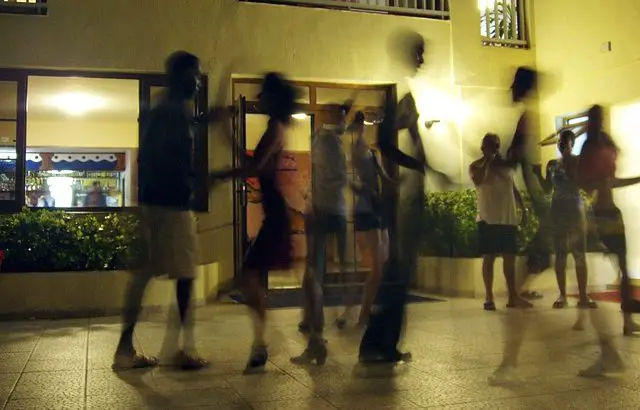Latin music is well known for making your shoulders, hips and legs move without you wanting it, even if you have no sense of rhythm whatsoever. There are many, many Latin music genres, but perhaps the most popular ones are salsa, merengue, bachata and nowadays the very controversial and immensely popular reggaetón. I will come back to the controversial factor of the reggaetón though. In the Hungarian culture music has a function, and if they are listening to Latin music most probably they are partying and/or dancing. Other genres are used for when doing sports, to relax or to convey emotions or what they think about a topic. Bottom line is that in Hungary there is always an objective when listening to music. In Latin America is different, music is life itself, music is our engine, our fuel, almost the reason we wake up everyday. Funny that when my parents came to visit me in Hungary for the first time, their first impression was that Budapest is silent. But why? Because in Panama every minute of the day, every day of the year, wherever you are there is music in the background. Haha.. Well, not if you are in the jungle. Even in Mother´s day, 8th of December at 6 o clock in the morning, young guys arrive to their Mother´s place accompanied by Mariachis singing (or shouting) serenades moderately or highly under the effects of alcoholic drinks. Yeah, just like that. Music is everything.
And now that I have mentioned my home country and also reggaetón, did you know that the biggest argument in the reggaetón world is what was its origin or where was it born? In Panama, in the afro Caribbean communities, Caribbean reggae and Spanish reggae was always popular, no wonder. I vividly remember the sound of reggae always in the background when playing hide and seek or soccer at the age of 5 years old. A Panamanian reggae singer of those times, El General (Eduardo Franco) is it said to be the Father of the genre, and although he was somewhat internationally recognized, the country that took reggaetón to the sky was Puerto Rico. I bet you remember Don Omar, and the perhaps not so well known Tego Calderón. Do not worry if you do not know any of them, for sure you know Luis Fonsi and Daddy Yankee, or at least their voices in the song Despacito. The genre´s second and most controversial topic is its lyrics, at least for those who speak Spanish. Many think reggaetón is not music despite their catchy or contagious nature. In Hungarian they called this fülbemászó, which is in fact a bug that supposedly gets into your ears. That is a legend, although the bug´s name is really earwig. Anyway, coming back to music, if we translate fülbemászó literally to English the result is – it gets into your ears. That is what they called songs fülbemászó, the song crawls into your ears and stay there. Back to reggaetón lyrics, despite its rhythm, lyrics are worth nothing or have no meaningful message and so that is why many people do not consider reggaetón real music. This argument became even more heated when singers of the likes of Bad Bunny started winning international awards. Social media exploded.
And now that I have mentioned my home country and also reggaetón, did you know that the biggest argument in the reggaetón world is what was its origin or where was it born? In Panama, in the afro Caribbean communities, Caribbean reggae and Spanish reggae was always popular, no wonder. I vividly remember the sound of reggae always in the background when playing hide and seek or soccer at the age of 5 years old. A Panamanian reggae singer of those times, El General (Eduardo Franco) is it said to be the Father of the genre, and although he was somewhat internationally recognized, the country that took reggaetón to the sky was Puerto Rico. I bet you remember Don Omar, and the perhaps not so well known Tego Calderón. Do not worry if you do not know any of them, for sure you know Luis Fonsi and Daddy Yankee, or at least their voices in the song Despacito.

The genre´s second and most controversial topic is its lyrics, at least for those who speak Spanish. Many think reggaetón is not music despite their catchy or contagious nature. In Hungarian they called this fülbemászó, which is in fact a bug that supposedly gets into your ears. That is a legend, although the bug´s name is really earwig. Anyway, coming back to music, if we translate fülbemászó literally to English the result is – it gets into your ears. That is what they called songs fülbemászó, the song crawls into your ears and stay there. Back to reggaetón lyrics, despite its rhythm, lyrics are worth nothing or have no meaningful message and so that is why many people do not consider reggaetón real music. This argument became even more heated when singers of the likes of Bad Bunny started winning international awards. Social media exploded. Just take a look at this meme
Nonetheless, Despacito or reaggaetón were not always the representatives of Latin music obviously. There are many, many Latin genres, I mentioned salsa, merengue and bachata, however there is also kizomba for instance. It is interesting that when people think about Latin music, usually never think about Africa, but some genres are actually from there. Caribbean reggae is the obvious one. Merengue not so, everybody thinks about merengue being from Dominican Republic mainly because of Juan Luis Guerra, one of the most famous merengue artists. However merengue was born either in Haiti, the neighbour country or in Madagascar says another theory. Now Kizomba, despite being Panamanian, I got to know it here in Hungary because of dancers from Venezuela, but it is from Angola. Similar to merengue, kizomba was made famous in Venezuela and in Brazil, but it is from Africa. Historically though, salsa is our most recognized genre, I think there is no doubt of that, but there is also ranchera from Mexico, or well, Latin-pop, or ballads which we listen in the mornings or when someone broke our hearts. Spanish rock is also a must to mention, especially in South America.
Just realized I did not mention fusion music. In Latin culture fusion music is as natural as in our people. Latin American people´s biggest ethnic groups are of course its own indigenous people, additionally Europeans, not only because of Spain, but also Portugal and in the case of Argentina Italy because of different reasons. Africa is the other main ethnic group, there are communities of African descent in most Latin countries, not only in the Caribbean islands. Lastly, we also have Asian descent, for example in the case of Peru with its Japanese Peruvians. All that diversity in our people resulted in fusion music. Nowadays, the fusion happens between the historically acclaimed salsa and our currently most controversial genre, reggaetón. Even Hungary has its own salsa-reggaetón Latin music band, you can check their latest video at the end of this article.
Two years ago I started cycling with some people from the Spanish-Latin community of Budapest. There are many small Facebook groups for Spanish speakers and one is for cycling, so in one occasion I went cycling with them and got to know this guy from Honduras. While cycling we started chatting, because we just cannot be silent and it happened to be that we arrive to Hungary almost in the same circumstances. He was a bit more lucky though, but we were both working on cruise ships as waiters, fell in love with a Hungarian woman, and ended up in Hungary. He could continue his hospitality and tourism career, that is why I said he was luckier than me, he got to work in a hotel in Budapest´s city centre. One night, while he was serving guests, his Manager asked him if he would like to sing, and so he did not even reply, next thing he was doing was singing and dancing for the audience. Ever since, and as most of foreigners in Hungary, he has worked in multinational companies, but as a side hustle he has a music band called Mai Rumba.
The word – rumba – means party in Spanish, but at the same time is yet another Latin music genre, from Cuba. The word – Mai – means of today in Hungarian, so all in all – Mai Rumba – means today´s party. The band´s name has a symbolic meaning which refers to the way we Latino people live ours lives, only thinking about today. Pretty much in any aspect of our lives, we live the present and very little look at the past or to the future. That is especially true when we party. In other words, carpe diem. Enjoy what you have, enjoy the moment, live today, forget the past and do not think about the future. Generally speaking, that is the main principle in our mentality. So, if you like Latin Music and would like a real party for your friends or family in Hungary, where you forget about everything and enjoy the joyful Latin culture, contact Mario´s Mai Rumba in this link.
In this video you can get a feel of Mai Rumba by listening to their newest and sticky self-composed song.
Sponsored content, collaboration with Mario Ochoa´s Latin Music band.

